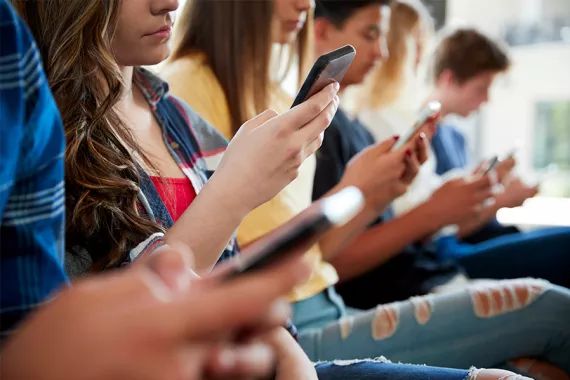
The Legal Team
- Andrew P. Arnold
- Esther E. Berezofsky
- Ebony Williams Bobbitt
- Riley Breakell
- Abigail Burman
- Jessica L. Carroll
- Grace P. Chandler
- Jessica C. Colombo
- Sara O. Couch
- Nelson L. Drake
- Jade A. Haileselassie
- Marlon E. Kimpson
- Annie E. Kouba
- Tope O. Leyimu
- Paul T. Lyons
- Kate E. Menard
- Donald A. Migliori
- Lance Oliver
- Jonathan D. Orent
- Joseph F. Rice
- Tammy Cauley Rivers
Case Overview
Studies show serious dangers are linked to social media use. These dangers include the risk of mental health issues, cyberbullying, self-harm, and suicidal thoughts and behaviors. The risks of social media may particularly affect tweens and teens. Learn more about how social media is used and the harm it can do.
Key takeaways about the dangers of social media for youth
- Studies show links between social media use and a number of mental health harms.
- Experts believe social media companies designed products to target children’s vulnerabilities and get them addicted.
- Individuals and government agencies such as school districts are suing big tech companies to hold them accountable for their role in a growing youth mental health crisis.
The negative impact of social media on youth
A majority of U.S. adolescents (children aged 13 – 18) use social media every day. For some, use of social media can become addictive or compulsive, with potentially dangerous consequences. Particularly problematic are YouTube, TikTok, Snapchat, Instagram and Facebook, the most popular social media platforms among young people.
A 2021 advisory from the U.S. Surgeon General, Dr. Vivek Murthy, describes the risks and dangers associated with social media use.
“The challenges today’s generation of young people face are unprecedented and uniquely hard to navigate.” Murthy wrote. “And the effect these challenges have had on their mental health is devastating.”
Particularly problematic are:
These are the most popular social media platforms among young people.
Learn about social media addiction and statistics here.
Mental health impacts of adolescent social media use
The Surgeon General’s advisory described several negative effects of social media, including:
- Anxiety
- Body dissatisfaction (body image issues)
- Depression
- Exposure to bullies
- Low self-esteem
- Poor mental health, contributing to development of eating disorders
- Poor sleep habits
- Self-harm
- Social comparison
Studies show teens who spend more than three hours daily on social media platforms are more likely to develop mental health issues.
Other negative effects of harmful online experiences
Social media platforms thrive on extended sessions by their users. As a result, social media companies have developed technology that encourages users to engage in compulsive and continuous use of their apps.
Learn more about the effects of social media on teens.
Cyberbullying linked to self-harm and suicidal behaviors
The amount of time spent on social media is not just spent scrolling through a platform’s feed. Young people may also interact with other users, and cyberbullying is also a risk for teens online. Researchers have found that “between 10% and 40% of teens will experience cyberbullying."
Other studies have found cyberbullying may contribute to self-harm, depression and suicidal behaviors. One study reported that “cyberbullying is associated with higher levels of depression, low self-esteem, behavioral problems, substance abuse, suicidal thoughts and attempt[ed suicide] for both the victim and the perpetrator.” A San Diego State University study also found teens who use social media and smartphones for over five hours a day are at 66% higher risk of engaging in suicidal behavior.
Help for self-harm and suicidal behavior
If you or a loved one are in crisis, national resources can help immediately.
- You can reach the National Suicide Prevention Lifeline at 988. This free and confidential call will connect you with a trained staff member. You can also visit their website: 988lifeline.org.
- You can contact the National Eating Disorders Association (NEDA) toll-free number at 1-800-931-2237. The association’s website can also direct you to resources at NationalEatingDisorders.org.
Trained professionals can help addicted users. People addicted to social media may also be eligible to file a lawsuit seeking compensation for social media addiction and harms.
Lawsuits aim to hold social media companies accountable
As of April 1, 2025, 1,745 individuals and government agencies have filed lawsuits against social media companies. To handle the volume and similarity of these cases, the federal courts have organized them into a single mass tort called a multidistrict litigation (MDL) docket. The social media mental health harm MDL is designated as In re: Social Media Adolescent Addiction/Personal Injury Products Liability Litigation, MDL No. 3047.
Who can file a social media harm lawsuit? Parents or guardians can file a lawsuit against social media companies on behalf of their minor children who suffered mental health harms such as suicidal ideation, eating disorders and depression requiring hospitalization. Young adults can also file a lawsuit if they were minors when their trauma was diagnosed or treated.
Individual lawsuits
People are filing individual lawsuits against social media companies alleging features of social networking apps caused them or their children to become addicted. These features – such as autoscrolling, image filters and notifications – fostered the problematic use of social networking apps which allegedly led to mental health problems in children and adolescents.
Individuals who have filed lawsuits in the MDL include:
- Parents or legal guardians suing on behalf of a child who was harmed by social media. Harms may include mental health problems, self-harm and suicidal ideation
- Adults (18 or older) who were harmed as minors (17 or younger) filing lawsuits on their own behalf
School district lawsuits
School districts have filed lawsuits in the federal MDL.
Attorneys representing school districts allege the addictive features of social media platforms:
- Cause a financial burden for schools and their employees
- Disrupt lesson plans by harming students’ mental health and reducing their attention spans
- Stress the limited mental health resources available to students
Motley Rice represents some of the school districts in the MDL.
State and local government agencies
Local government agencies consider themselves “first responders” in providing youth mental health resources. They allege social media companies’ conduct has further burdened their resources and compromised their ability to meet the public’s needs.
Youth and teen mental health issues have also led to property damage. State, regional, and local government agencies bear the costs of addressing that damage.
The negative impact of social media on youth
Mental health impacts of adolescent social media use
Cyberbullying linked to self-harm and suicidal behaviors
Our experience helping teens and families
Our attorneys at Motley Rice have worked for decades fighting for people and families. We have experience dealing with technology and media companies.
- We have filed lawsuits on behalf of people addicted to Instagram.
- Motley Rice lawyer Previn Warren has been appointed as co-lead counsel for the National lawsuit on social media harm.
If you need help filing a lawsuit for Instagram or Facebook addiction, our law firm can help. Your well-being, and the wellbeing of all your loved ones is important to our team.
Please also contact a doctor, mental health professional, and/or crisis hotline if you need immediate help dealing with the negative impacts of social media.
Lawsuits aim to hold social media companies accountable
Our experience helping teens and families
- Sources
1. Judicial Panel on Multidistrict Litigation. Pending MDLs.
Start Your Motley Rice Consultation in Simple Steps
Submit Information
Call us or fill out our online form with the details of your potential case.
Case Review
Our team reviews your information to assess your potential case.
Case Consultation
Talk with us about next steps.



